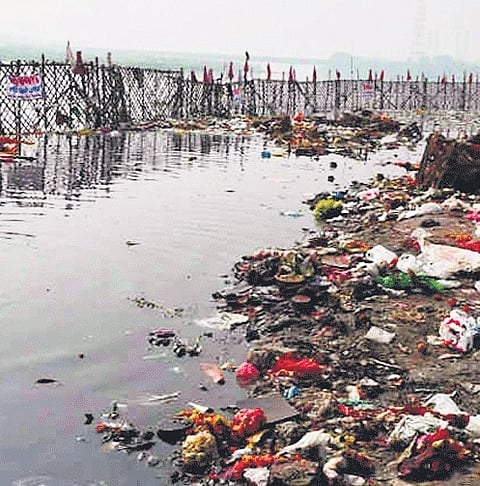

NEW DELHI: In a decisive ruling aimed at safeguarding the sensitive Yamuna flood plains ecosystem, the Delhi High Court has upheld the demolition of an unauthorised structure, known as the ‘Prachin Shiv Mandir,’ near the river in the Geeta Colony area.
The division bench, led by Acting Chief Justice Manmohan and Justice Tushar Rao Gedela, dismissed appeals against a previous order allowing the demolition, asserting that the appellant lacked any legal basis to challenge the demolition of the structure.
The appellant, ‘Prachin Shiv Mandir Avam Akhada Samiti’, claimed that the site had historical and religious significance, purportedly established by a revered priest known for founding numerous Shiv Lingas. However, the high court found no substantial evidence supporting the appellant’s ownership over the disputed site, nor did it find merit in the argument that the temple’s demolition violated principles of natural justice.
The court’s order, issued on July 10, emphasised that the temple was constructed on encroached land within the Restoration and Rejuvenation Zone of the Yamuna River Floodplain, designated for environmental preservation.
“No structure, religious or otherwise, can be permitted to stand on encroached land in such an eco-sensitive area,” the bench said unequivocally.
Highlighting that the Delhi Development Authority (DDA) had already demolished the entire structure, the court underscored the need to protect public land from unauthorized constructions. “The construction of the temple was not only unauthorized but also subject to lawful removal by the DDA,” the court reaffirmed.
Further, the bench dismissed assertions regarding the ownership jurisdiction, noting that while the land belonged to the State of Uttar Pradesh, the DDA was authorized to act against encroachments in the area as per the Memorandum of Understanding.
Asserting the need to protect the Yamuna floodplains, the bench held, “The Yamuna River Floodplain has to be zealously protected from such encroachment and unauthorized constructions.”
The appellant argued that they had not received any demolition order, also claiming that they were not given any opportunity by the Religious Committee before it recommended the demolition.
The court however rejected the allegation of violation of principles of natural justice by the Religious Committee, saying an “encroacher on public land carrying out unauthorized construction cannot make a grievance of the same”.
Earlier a single judge bench had refused to set aside the demolition order, while also refusing to make the deity a party to the petition.